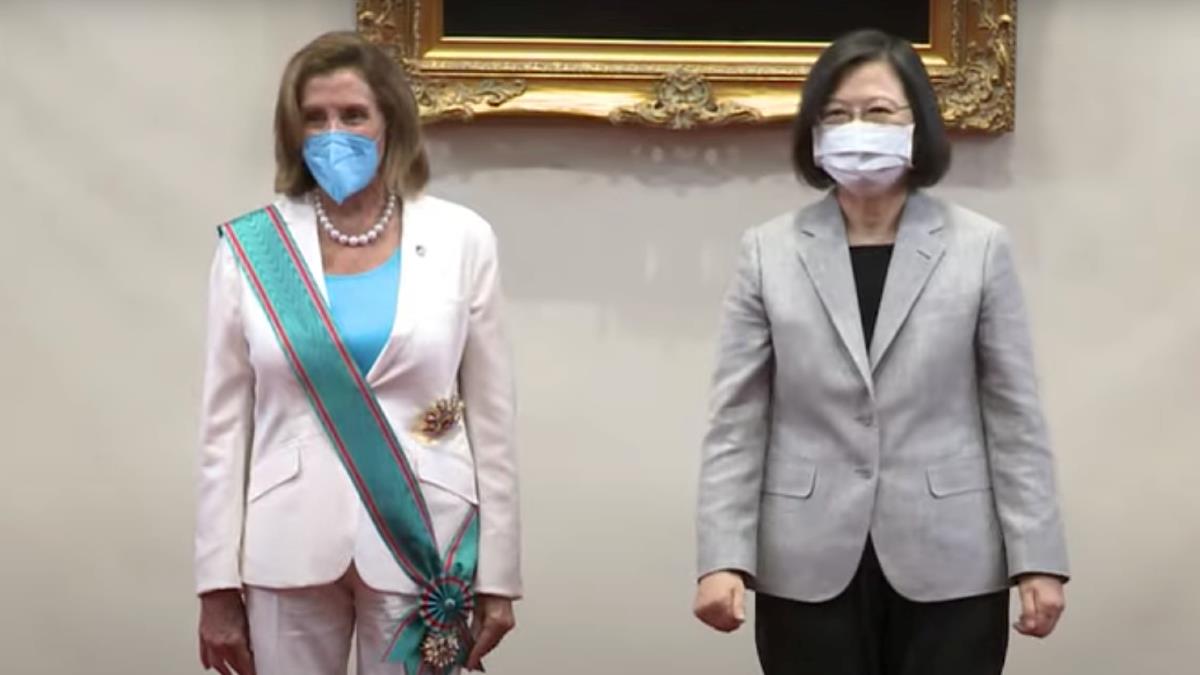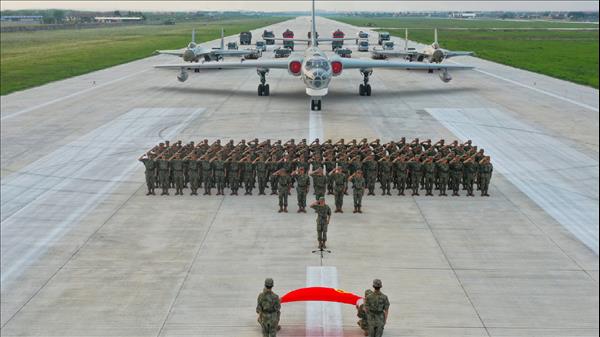
Taiwan's KMT Reaches Out In Vain To The Mainland
Kuomintang (KMT), Taiwan's largest opposition party, was stuck in the geopolitical middle after sending a delegation to mainland China, a move that stoked criticism on both sides of the troubled Taiwan Strait.
The KMT, which ruled mainland China between 1925 and 1948, last week sent a delegation to the mainland and will meet Taiwanese firms and students there on August 21 after finishing a 10-day quarantine period.
KMT leaders said the trip was aimed at easing the political tensions in the Taiwan Strait, although it might have a negative impact on the party at local elections due in November. They said the KMT did not have any plans to go to Beijing or meet Chinese officials.
Beijing has not yet announced whether mainland officials will officially receive them. Chinese mouthpiece media said it was not meaningful for the KMT to visit the mainland now because the party had joined the self-governing island's warm welcome for Nancy Pelosi, the Speaker of US House of Representatives, during her Taiwan visit in early August.
The state media reports said the KMT was a declining political power and faced constraints in supporting national reunification.
Taiwan's Mainland Affairs Council, currently controlled by the ruling Democratic Progressive Party (DPP), said the KMT should avoid visiting the mainland at a time military tensions are running on high in the Taiwan Strait.
In a phone call on July 28, Chinese President Xi Jinping told US President Joe Biden that the US should follow the“One China” policy and not support“Taiwan independence.” However, Pelosi continued her planned schedule but landed in Taiwan on August 2 and met Taiwanese President Tsai Ing-wen on August 3.

US House Speaker Nancy Pelosi meets with Taiwanese President Tsai Ing-wen on August 2, 2022. Photo: Taiwan Presidential Office
After Pelosi's departure, the PLA held a three-day exercise near Taiwan and launched at least 11 Dongfeng ballistic missiles near Taiwan, with some flying over the island and some falling into Japan's Exclusive Economic Zone, between August 4 and 6.
State media said last week that after this round of drills, the PLA had turned its military plans into realistic options and these type of drills will become a new normal. They said the PLA would seamlessly turn a future exercise into actual combat, especially when the Taiwanese army was tired and lost its preparedness.
Some Western columnists said the US should avoid sending politicians to Taiwan as the Ukraine war had not yet ended.
Thomas Friedman, an opinion columnist at the New York Times, wrote in an article on August 1 that he respected Pelosi but he thought her visit to Taiwan was“utterly reckless” as the Chinese military's strong response would push the US into indirect conflicts with Russia and China, both nuclear-armed, at the same time.
Last Wednesday, KMT's vice chairman Andrew Hsia said he would soon lead a delegation to visit mainland China. He said the visit was planned several months ago and was intended to understand the difficulties Taiwanese firms and students living on the mainland face.
The delegation will begin its activities on August 21. It will first meet Taiwanese companies in Xiamen in Fujian province and then visit Guangzhou, Shenzhen and Dongguan in Guangdong province. It will meet business people in Zhejiang, Jiangsu and Shanghai between August 23 and 25 and return to Xiamen before flying back to Taiwan on August 27.
Taiwan's Mainland Affairs Council said it was regretful that the KMT insisted on visiting the mainland shortly after the PLA held a massive military exercise around the island.
It said the KMT should condemn the PLA's drills and show that it was standing together with the Taiwanese people. It warned that the KMT would fall into the trap of the Communist Party of China (CPC), which wanted to use military threats to push forward a negotiation about reunification.
On August 13, KMT chairman Eric Chu Li-luan said the party had already discussed with political experts about the effect of sending a delegation to mainland China.
Chu acknowledged that the trip would negatively affect the KMT's performance in the local elections in November but it was still worth it to maintain a communication channel between Taiwan and mainland China. He said if such a channel was cut-off, the deterioration in relations would eventually hurt the island.
Two other KMT heavyweights, including former chairman Ma Ying-jeou and 2024 Taiwan presidential election's potential KMT candidate Jaw Shaw-kong, also said over the weekend they supported Hsia's trip.
Chinese military commentator Liu Yong said the KMT would strengthen support from its voters if it could maintain a dialogue with Beijing when military tensions in the Taiwan Strait were high. Liu said the DPP opposed the KMT's mainland trip as it feared that the KMT could gain votes in November.
Liu said Taiwan and mainland China had maintained a close economic relationship over the past two decades while many Taiwanese people had taken it for granted. He said without the mainland's help, the Taiwanese economy would have collapsed a long time ago.
He noted China had stopped importing Taiwanese fruits and frozen seafood after Pelosi's Taiwan visit. He said Taiwanese companies in the mainland had felt the pain but the DPP could not offer any help to them. He said by visiting Chinese cities, the KMT could show its supporters that it had the ability to change and stabilize the situation.
However, Liu also criticized the KMT for becoming another pro-US party like the DPP in recent years. For example, he said many KMT politicians had welcomed Pelosi during her visit to Taiwan in early August.
According to the KMT's Facebook, the party issued several statements in early August to praise Pelosi for standing up for Taiwan and supporting the island's democratic development.
In a Facebook post on June 29, the KMT said the Republic of China (ROC) is a sovereign state and has never stopped its ruling in Taiwan since 1945. Until now, Beijing has not yet said whether any Chinese officials would meet Hsia during his mainland trip.
In articles and videos, Chinese media said it was not meaningful for the KMT to visit the mainland now as it would not be able to adopt a pro-Beijing stance in the short run due to the political realities before Taiwan's“nine-in-one elections” to elect local officials and councilors on November 26.
China Review News Agency, a Hong Kong-based pro-Beijing website, said in an article on July 30 that the KMT's Chu had faced criticism from key party members after he praised former Taiwanese leader Lee Teng-hui for promoting democracy in Taiwan. Chu said the KMT had no intention of changing its evaluation of Lee's tenure.
Lee served as Taiwan's president and chairman of the KMT between 1988 and 2000. After he was expelled from the KMT, he set up the Taiwan Solidarity Union in 2001 to push forward a localization movement.
Another Chinese article said on August 13 that since the KMT was forced to leave mainland China in 1949, its political power had been weakening. It noted that the KMT again lost in the presidential election in 2000 to the DPP and failed to reform itself during its return between 2008 and 2016.
It said it was disappointing that KMT's Han Guo-yu was forced to step down from his position as Kaohsiung mayor in mid-2020.

PLA soldiers under training. Photo: Eastern Theater Command
Meanwhile, US Senator Ed Markey and a bipartisan, bicameral US congressional delegation landed in Taipei on August 12 on a two-day visit to discuss bilateral security, economic and trade developments.
Markey met President Tsai and other Taiwanese officials on Monday. They also met members of the private sector to discuss shared interests including reducing tensions in the Taiwan Strait and investments in semiconductors.
Markey said he believed that US-Taiwan ties would continue to grow and that the US had a moral obligation to ensure Taiwan's peace and stability amid rising uncertainties in the region.
Tsai said Taiwan was happy to see that the US had recently passed the Chips and Science Act and that the island's chip makers were interested in investing in the US.
The People's Liberation Army (PLA)'s Eastern Theater Command said on Monday (August 15) it had started new drills to deter the US, which it said was playing tricks with the Taiwan issue and undermined peace and stability in the Taiwan Strait.
Ma Xiaoguang, a spokesperson for the Taiwan Affairs Office of China's State Council, said Markey's Taiwan visit was another example that the US was intentionally disrupting peace and stability in the Taiwan Strait.
“The erroneous act seriously violated the One China principle and the provisions of the three Sino-US joint communiques, and we firmly oppose it,” Ma said.“It fully exposes the sinister intentions of the US in using Taiwan to contain the mainland, and the DPP authorities in relying on the US to seek 'independence.'”
Ma said some US politicians had not learned from the serious consequences that followed Pelosi's visit to Taiwan. He said the DPP authorities would face more severe measures if they continued their“separatist” actions.
Read: China's laggard chips industry rotten with corruption
Follow Jeff Pao on Twitter at @jeffpao3

Legal Disclaimer:
MENAFN provides the
information “as is” without warranty of any kind. We do not accept
any responsibility or liability for the accuracy, content, images,
videos, licenses, completeness, legality, or reliability of the information
contained in this article. If you have any complaints or copyright
issues related to this article, kindly contact the provider above.
Most popular stories
Market Research

- Currency Relaunches Under New Leadership, Highlights 2025 Achievements
- SPAYZ.Io White Paper Explores Opportunities, Challenges And Ambitions In Payments Industry
- Alt.Town Introduces $TOWN Token Utility Across Platform Services And Launches Valuefi Deposit Event
- Grok AI Identifies MGC And The RZ Ecosystem As A Safe Haven For Crypto Investors Amid Global Market Crash
- Salvium Solves The Privacy Paradox: Salvium One Delivers Mica-Compliant Privacy That Exchanges Can List
- Luminadata Unveils GAAP & SOX-Trained AI Agents Achieving 99.8% Reconciliation Accuracy




















Comments
No comment